In a world where travelers crave convenience and spontaneity, hotel booking apps have become indispensable travel companions.
With the global online travel booking market projected to reach $1,800 billion by 2030, there’s never been a better time to build your own hotel booking app and turn it into a scalable business.
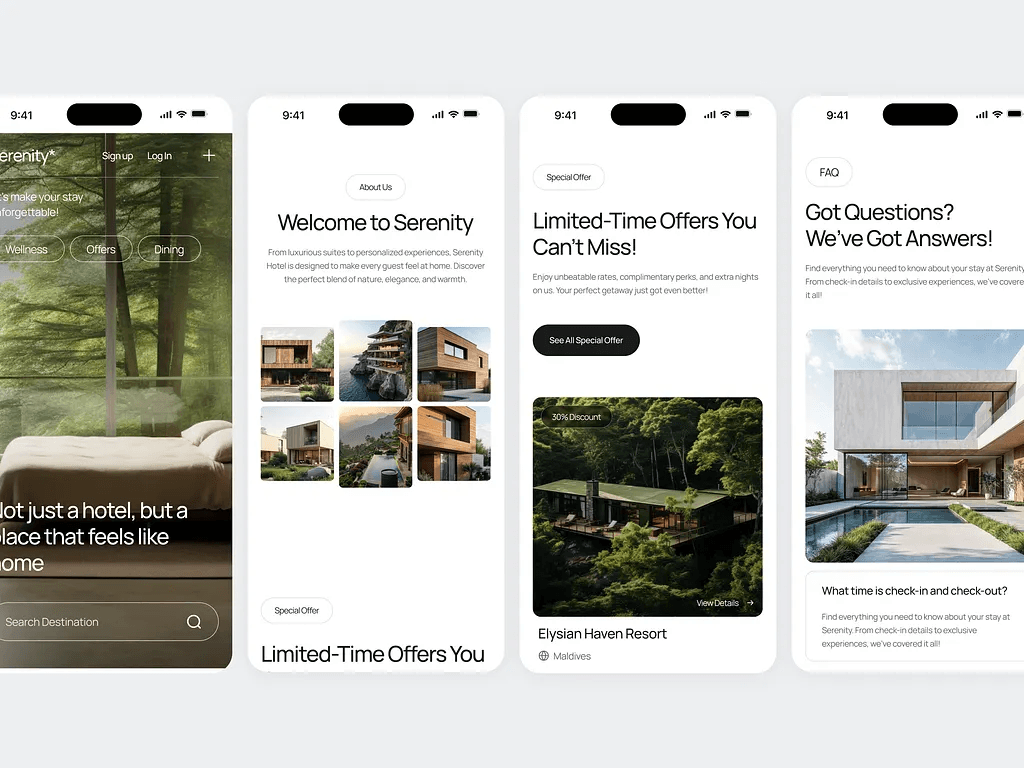
From startups to established travel agencies, everyone’s asking:
- How do I create a hotel booking app like Booking.com or Airbnb?
- What features make a hotel booking app successful in 2025?
- How much does it cost to build a hotel booking app?
- Can I monetize a hotel booking app without owning a hotel?
The answer? With the right features, user experience, and marketing strategy, your hotel booking app can stand out in a saturated marketplace and generate significant revenue.
In this blog, we’ll walk you through every stage of the hotel booking app development process, from ideation and UX best practices to post-launch strategies and performance tracking.
Whether you’re a tech founder, hospitality business owner, or travel entrepreneur, this guide will help you build, launch, and scale a profitable hotel booking app in 2025.
Why Invest in a Hotel Booking App in 2025?
2025 is seeing the travel industry not just recovering from the tragic COVID-19 pandemic but evolving. Digital bookings now dominate the hospitality sector, and mobile apps are leading this transformation.
According to Statista, over 74% of travel bookings are made online, with more than 60% of those happening on mobile devices.
This shift has created an immense opportunity for businesses and entrepreneurs to tap into the convenience-seeking behavior of modern travelers.
1. Skyrocketing Market Demand
Travelers today expect instant hotel confirmations, personalized recommendations, real-time availability, and secure digital payments, all within a few taps. The surge in demand for self-managed bookings has made hotel booking apps not just a convenience but a necessity.
2. Post-Pandemic Travel Boom
With global tourism steadily climbing after the pandemic slump, more people are opting for short getaways, staycations, and remote work-friendly stays. This “new normal” is fueling the need for hotel apps that offer flexibility, last-minute deals, and a seamless digital experience.
3. Competitive Advantage for Hotel Owners
For hoteliers and property owners, investing in an app opens the door to direct bookings, bypassing hefty OTA (Online Travel Agency) commissions. With the ability to build loyalty programs, send push notifications, and collect user data, hotel booking apps become powerful tools for customer retention and brand building.
4. High-Profit Potential for Aggregators
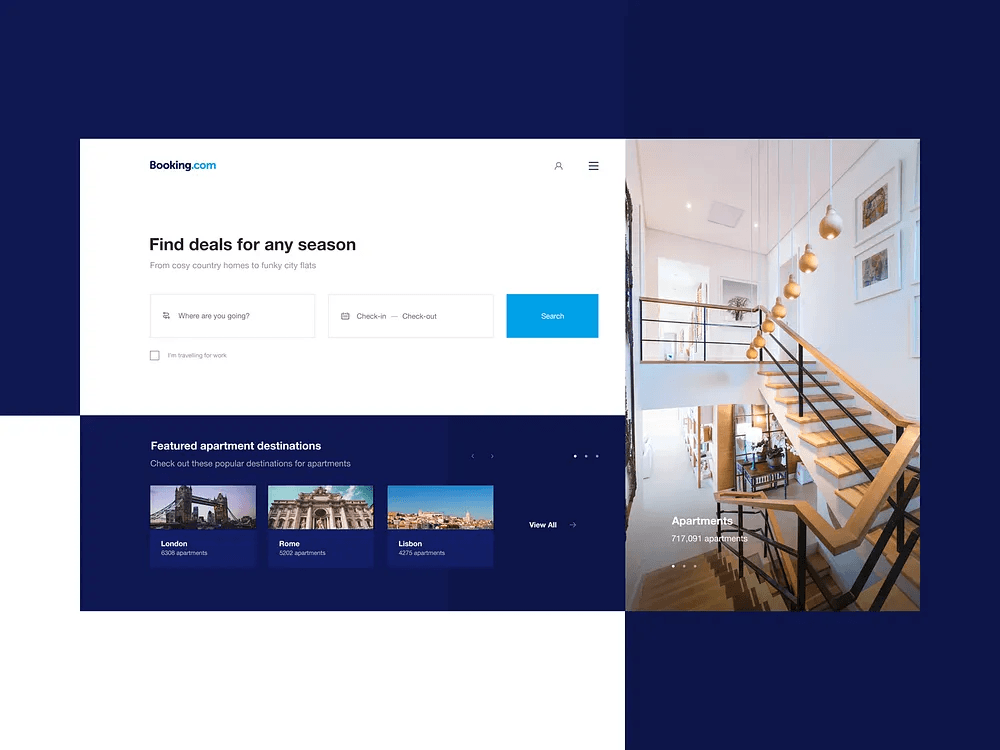
You don’t need to own a hotel to profit from the industry. Aggregator models, like Airbnb and Booking.com, prove that tech entrepreneurs can build platforms connecting guests with accommodations and earn through commissions, premium listings, and value-added services.
5. Scalable Business Model
Hotel booking apps are inherently scalable. Once your app architecture and vendor integrations are in place, scaling across geographies or niches (luxury stays, eco-hotels, pet-friendly stays, etc.) becomes a streamlined process.
Key Features of a Successful Hotel Booking App
Building a hotel booking app that stands out means packing it with features that meet modern travelers’ expectations while providing seamless management tools for hotels and admins. Below are the essential features your app must have to ensure success and user satisfaction.
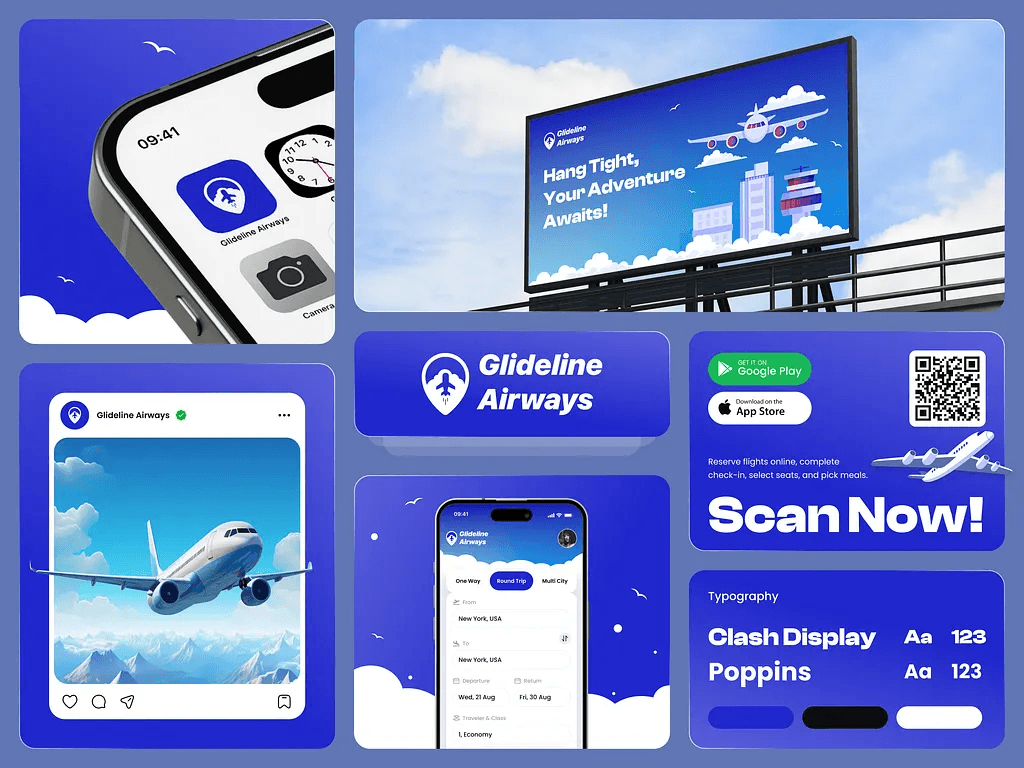
1. Powerful Search and Filtering Options
A robust search engine is the heart of any hotel booking app. Users should be able to filter hotels by location, price range, star rating, amenities, room type, and even guest reviews. Advanced filters like proximity to landmarks or availability for specific dates help users find their ideal stay quickly and effortlessly.
2. Real-Time Availability and Booking
Nothing frustrates users more than discovering a hotel room is unavailable after they’ve invested time selecting dates. Integrate your app with hotel Property Management Systems (PMS) or third-party APIs to offer real-time room availability and instant booking confirmation, eliminating double bookings and delays.
3. User Profiles and Booking History
Allow users to create profiles where they can manage bookings, save favorite hotels, and view their booking history. Personalized experiences, such as tailored recommendations based on past bookings, encourage repeat usage and higher engagement.
4. Secure Payment Gateway Integration
Supporting multiple payment methods, credit/debit cards, digital wallets, UPI, and even “pay later” options, is crucial. Ensure that your payment system is PCI DSS compliant to protect user data and build trust.
5. Reviews and Ratings
User-generated reviews and ratings build transparency and influence booking decisions. Implement an easy-to-use system for guests to leave feedback, which also helps hotels improve their services.
6. Interactive Maps and Location Services
Integrate GPS and map features so users can visualize hotel locations, nearby attractions, and transportation options. This enhances the decision-making process and improves overall user satisfaction.
7. Push Notifications and Alerts
Keep users engaged with timely push notifications about booking confirmations, special deals, price drops, or personalized offers. This boosts retention and drives repeat bookings.
Recommended read: Integrating push notifications in React Native with Firebase!
8. Multi-Language and Multi-Currency Support
To attract a global audience, your app should support multiple languages and currencies, offering a localized and comfortable experience for international travelers.
9. Hotel Owner Dashboard
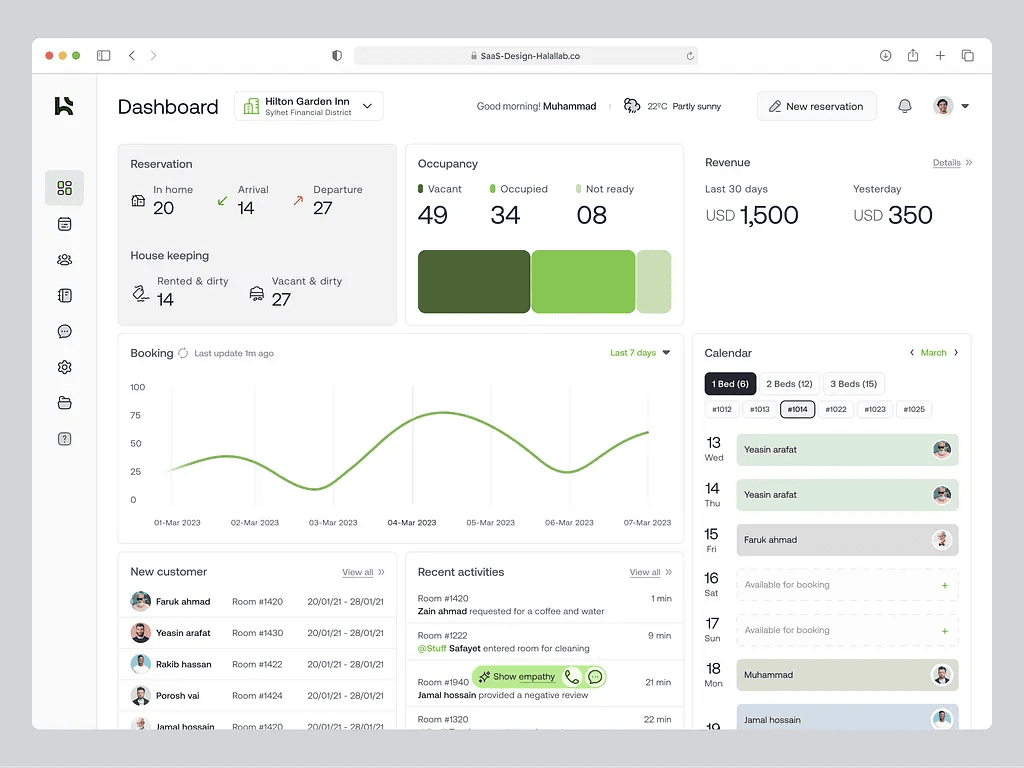
Empower hotels with a dedicated dashboard where they can manage room inventory, update pricing, handle bookings, and communicate with guests. This backend functionality is critical for smooth operations and real-time updates.
10. Admin Panel for App Management
A comprehensive admin panel allows you to monitor app activity, manage users, oversee transactions, and analyze booking data. This helps maintain app integrity, control content, and optimize performance.
11. Loyalty Programs and Discounts
Incorporate reward systems to incentivize users to book more frequently. Loyalty points, referral bonuses, and seasonal discounts increase user retention and promote app virality.
Each of these features plays a pivotal role in crafting an intuitive, reliable, and engaging hotel booking app that keeps users coming back and hotels happy to partner with you.
User Experience Best Practices for Hotel Booking Apps
A seamless, enjoyable user experience (UX) is crucial to the success of any hotel booking app. Travelers expect fast, intuitive, and hassle-free interactions that make their booking journey smooth from start to finish. Here are some best practices to ensure your app delivers on those expectations:
1. Simplified Onboarding
First impressions matter. Minimize friction by allowing users to sign up or log in quickly using social media accounts or email. Avoid overwhelming users with too many forms; instead, collect only essential information upfront and allow profile completion later.
2. Fast and Intuitive Search and Booking Flow
Speed is key. Optimize your app to load search results instantly and enable users to book with minimal taps. Incorporate smart defaults such as auto-filling dates or suggesting popular destinations to speed up the process.
3. Clear and Transparent Pricing
Surprise fees are a dealbreaker. Display the total price upfront, including taxes and fees, so users know exactly what they’re paying. Offering a price breakdown can boost trust and reduce cart abandonment.
4. Easy Navigation and Clean UI
Design a clutter-free interface with clearly labeled buttons and categories. Use familiar icons and consistent layout patterns that guide users effortlessly through browsing, filtering, and booking.
5. Personalization and Recommendations
Leverage user data to suggest hotels based on past bookings, location preferences, or trending destinations. Personalized offers and tailored content enhance engagement and increase the likelihood of bookings.
6. Multi-Device Compatibility
Ensure your app works flawlessly across smartphones, tablets, and desktops. Responsive design and cross-platform functionality expand your reach and improve user convenience.
7. Accessibility Features
Incorporate accessibility standards to make your app usable by people with disabilities. This includes voice commands, screen readers compatibility, and adjustable font sizes.
8. Instant Support and Chatbots
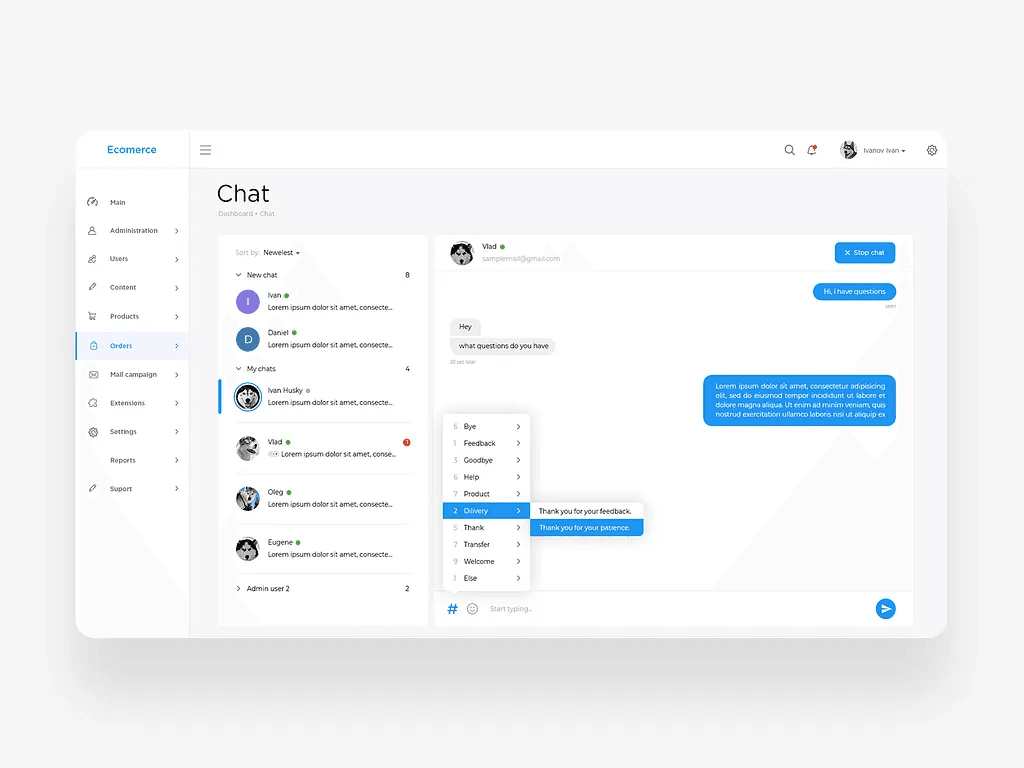
Provide quick access to customer support through live chat or AI-powered chatbots. Immediate help boosts user confidence, resolves issues promptly, and reduces app abandonment.
9. Post-Booking Engagement
Keep users engaged after booking by sending timely notifications about check-in details, cancellation policies, and personalized offers for upcoming stays.
By following these UX best practices, your hotel booking app can create a delightful user journey that encourages bookings, fosters loyalty, and generates positive reviews.
Step-by-Step Guide to Building Your Hotel Booking App
Building a hotel booking app is a multi-stage process that requires careful planning, design, and execution. Here’s a clear roadmap to help you transform your idea into a profitable business:
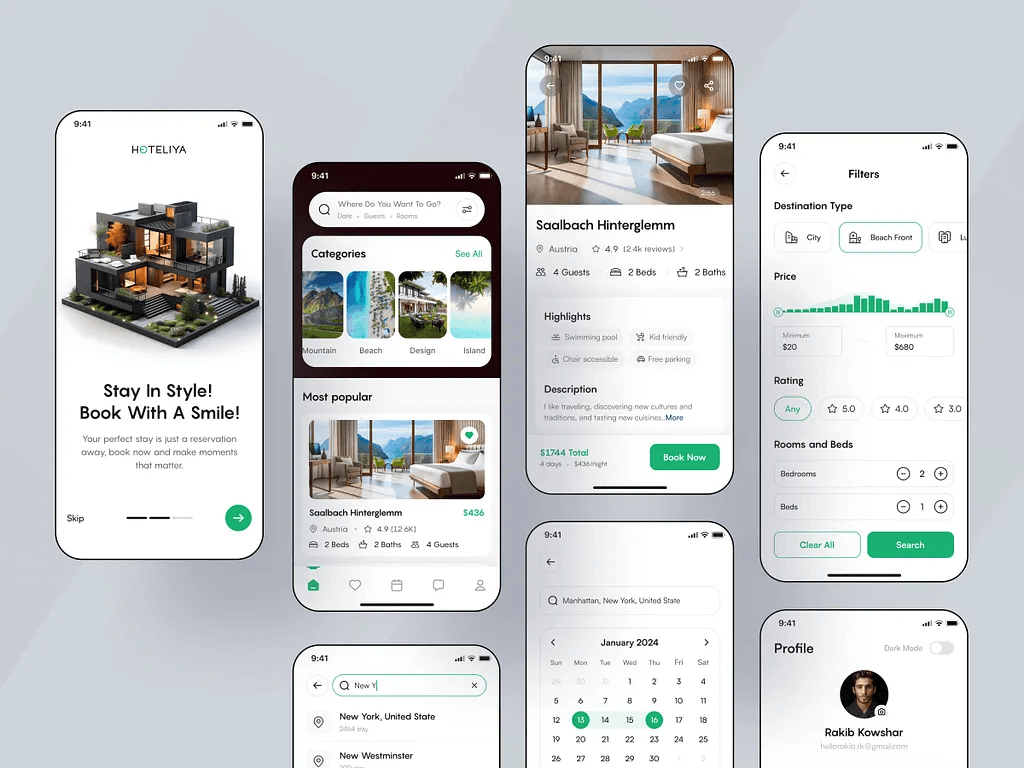
1. Market Research and Idea Validation
Begin by researching your target audience, competitors, and market trends. Identify pain points travelers face with existing apps and define your unique value proposition. Validate your idea by gathering feedback through surveys or MVP testing.
2. Define Core Features and App Requirements
List the essential features your app will include, such as search filters, booking engine, payment gateway, and reviews. Decide on platforms (iOS vs Android, or both) and technologies (native or cross-platform frameworks).
3. Design UX/UI Wireframes and Prototypes
Create wireframes to outline the app’s layout and user flow. Develop clickable prototypes to visualize the user journey and gather early feedback to refine the design before development.
4. Choose the Right Technology Stack
Select technologies that align with your app’s complexity, budget, and scalability needs. Popular choices include React Native or Flutter for cross-platform apps, and robust backend frameworks like Node.js or Django.
5. Develop Frontend and Backend
Develop the frontend interface that users interact with and build the backend to handle data management, API integrations (for hotel inventory, payments, maps), and user authentication.
6. Integrate Third-Party Services and APIs
Connect with hotel PMS systems, payment gateways, mapping services, and review platforms to enhance app functionality and reliability.
7. Testing and Quality Assurance
Conduct rigorous testing, including functional, usability, performance, and security tests, to ensure your app runs smoothly and safely across devices.
8. Launch and Deploy
Submit your app to app stores and prepare a launch strategy. Consider soft launching to a smaller audience for final feedback before a full-scale release.
9. Marketing Your Hotel Booking App Post-Launch
Develop a marketing plan including social media campaigns, influencer partnerships, SEO, paid ads, and email marketing. Encourage user reviews and referrals to build momentum.
10. Gather Feedback and Iterate
Use analytics and user feedback to continuously improve the app, fix bugs, and introduce new features that keep users engaged.
Analytics and KPIs to Track App Success
Tracking the right analytics and key performance indicators (KPIs) is essential to understand how your hotel booking app performs and where improvements are needed. Monitoring these metrics helps you optimize user experience, increase revenue, and scale your business effectively.
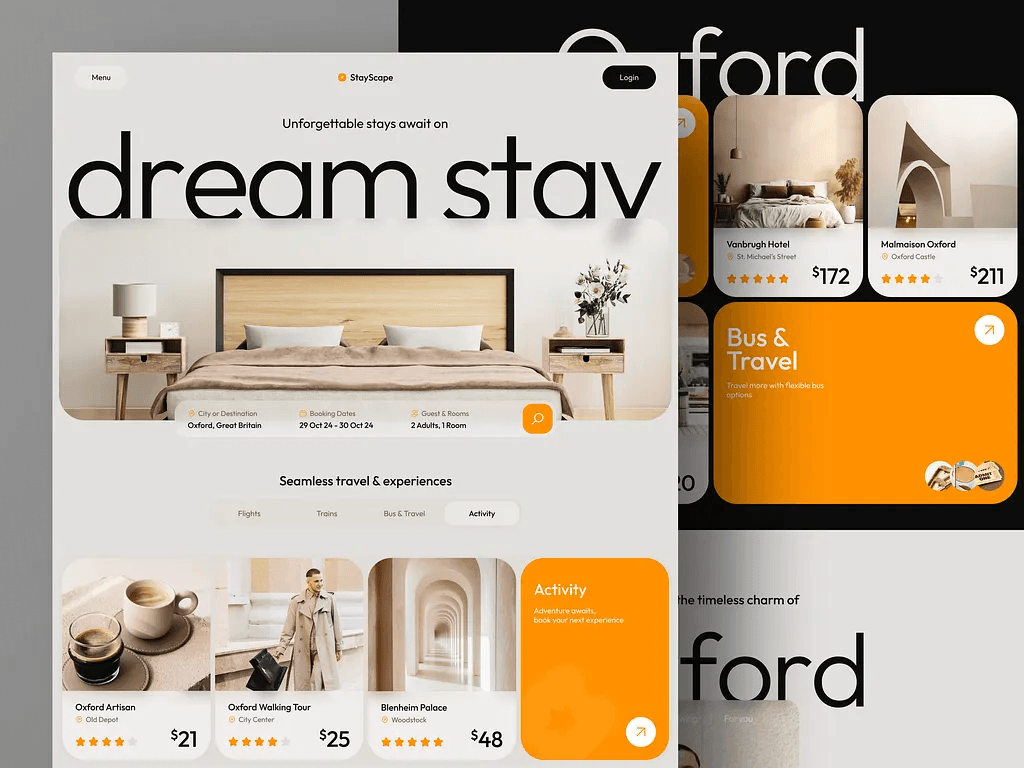
1. User Acquisition Metrics
Measure how many users download and install your app, as well as the sources driving these installs, organic search, social media, ads, or referrals. Cost per acquisition (CPA) is a critical metric to evaluate marketing efficiency.
2. User Engagement and Retention
Track how often users open your app and how long they stay. Metrics like daily active users (DAU), monthly active users (MAU), and retention rate show how well your app keeps users coming back.
3. Booking Conversion Rate
This KPI measures the percentage of users who complete a booking after searching. A low conversion rate signals potential UX issues or lack of compelling offers that need addressing.
4. Average Booking Value (ABV)
Monitor the average revenue generated per booking. Higher ABV indicates users are opting for premium rooms or longer stays, which boosts profitability.
5. Customer Lifetime Value (CLV)
Calculate the total revenue a user is expected to generate over their lifetime. Increasing CLV through loyalty programs and personalized offers is key to sustained growth.
6. Churn Rate
Identify the percentage of users who stop using your app over a given period. Reducing churn by improving app performance and user satisfaction helps maintain a loyal customer base.
7. App Performance Metrics
Track app load times, crash rates, and error reports to ensure your app runs smoothly. Technical issues directly impact user experience and retention.
8. Revenue Metrics
Keep an eye on total bookings, commission earned, in-app purchases, and ad revenue if applicable. These figures provide a direct view of your app’s profitability.
By continuously monitoring these KPIs and analyzing user behavior, you can make data-driven decisions that sharpen your app’s competitive edge and maximize business success.
Why Choose DianApps as Your Development Partner?
Building a hotel booking app requires more than just clean code, it demands industry insight, user-centric design, and a deep understanding of market scalability. That’s where DianApps stands out.
- Proven Track Record in Travel & Hospitality Tech
- Expertise Across Technologies
- User-First Approach
- API Integrations & Scalability
- End-to-End Development & Post-Launch Support
- Transparent Communication & Agile Execution
Final Thoughts
The hotel booking industry is evolving fast, and the time to act is now. With the right concept, features, and tech partner, your app can stand out in a competitive market and deliver real business value.
From streamlining guest experiences to maximizing bookings, a hotel booking app isn’t just a digital solution, it’s a strategic asset.
Ready to bring your hotel booking app to life?
Partner with DianApps and transform your idea into a profitable, future-ready business. Let’s build something incredible, together. Get in touch with our experts today!
Also do read the cost of building a hotel booking website!


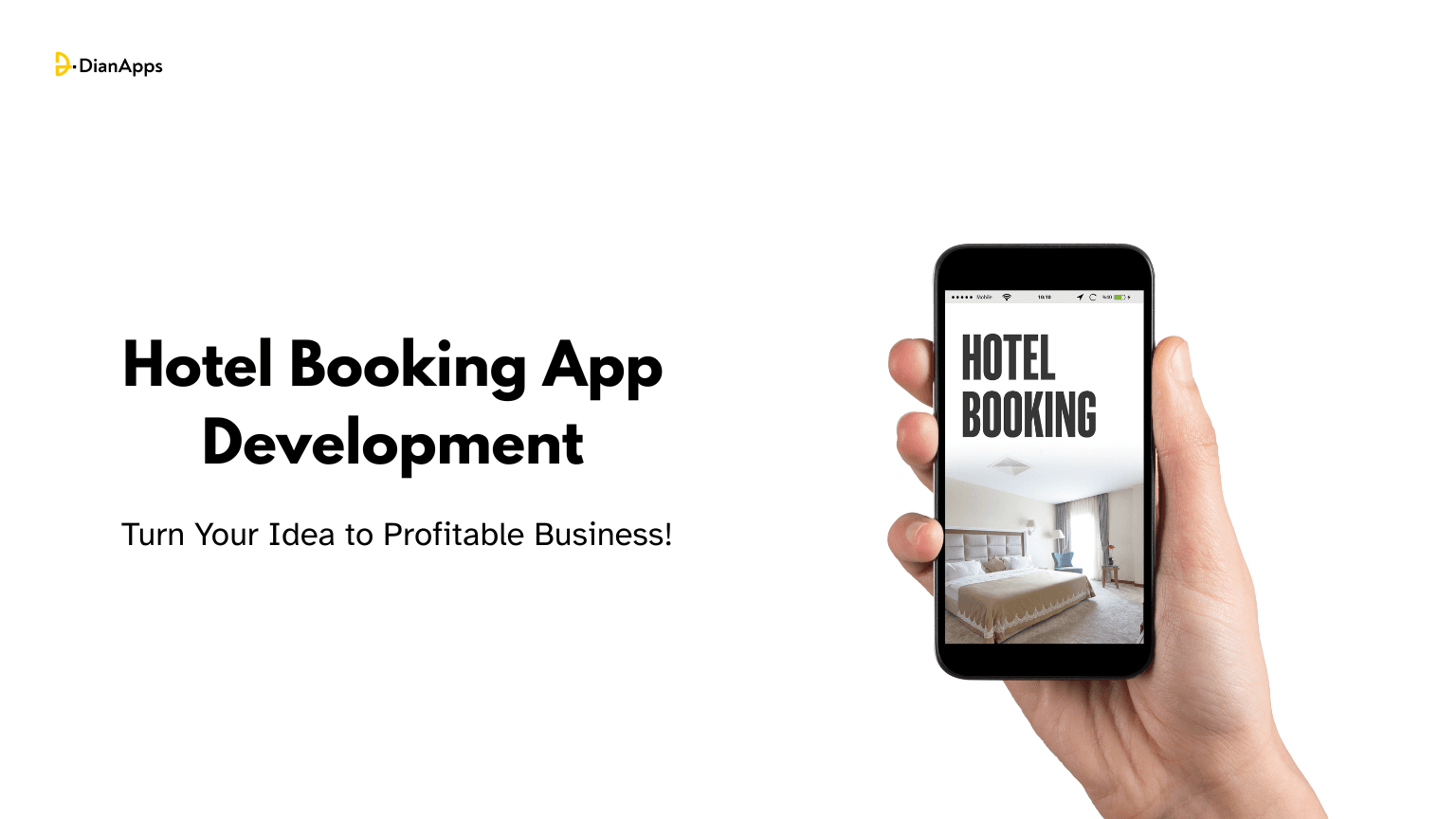







Leave a Comment
Your email address will not be published. Required fields are marked *